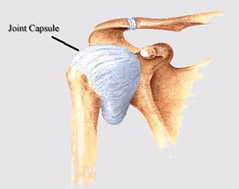Arthroscopic capsular release is keyhole surgery involving the release of the tight capsule seen in frozen shoulder. The capsule is released using a special probe.
 Frozen Shoulder is an extremely painful condition in which the shoulder is completely or partially unmovable. Frozen shoulder often starts out of the blue, but may be triggered by a mild injury to the shoulder. The condition goes through three phases, starting with pain, then stiffness and finally a stage of resolution as the pain eases and most of the movement returns. This process may take an awfully long time, sometimes as long as two or more years.
Frozen Shoulder is an extremely painful condition in which the shoulder is completely or partially unmovable. Frozen shoulder often starts out of the blue, but may be triggered by a mild injury to the shoulder. The condition goes through three phases, starting with pain, then stiffness and finally a stage of resolution as the pain eases and most of the movement returns. This process may take an awfully long time, sometimes as long as two or more years.
Frozen shoulder may be associated with diabetes and is also seen in patients with scar tissue in their hands, a condition called Dupuytren’s contracture.
Surgery may be required to restore motion for some patients, as most people never regain full shoulder motion. It is also used in patients where their pain fails to respond to physiotherapy treatment.
What are the benefits of having a Capsular Release?
Surgery has been shown to be of benefit in both the early and later stages of a Frozen Shoulder. It is excellent for both pain relief and restoring movement, although intensive physiotherapy is essential after the surgery. This procedure is successful in over 80% of patients.
What are the risks of having a Capsular Release?
All operations involve an element of risk, these are very small but you need to be aware of them and can discuss them with your doctor at any time. The risks are (less than 1%) but may include:
- Complications relating to the anaesthetic
- Infection
- Recurrence of shoulder stiffness
- Damage to nerves or blood vessels around the shoulder
Frozen Shoulder – BESS/BOA Patient Care Pathways document

